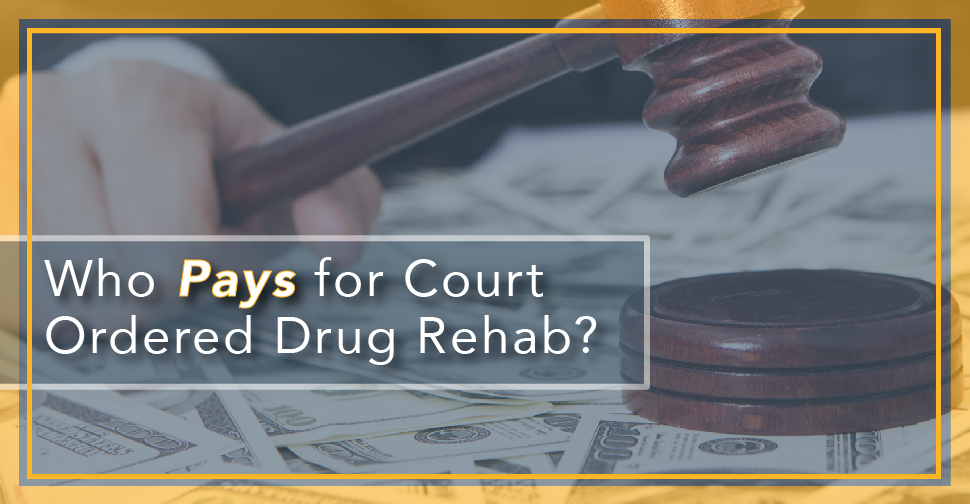
When the court steps in and orders you to attend drug rehabilitation, you may feel small and helpless, especially if your life is also plagued by money concerns. After all, somebody has to pay for your treatment and unfortunately, it’s most likely going to be you. But understanding why and how you can pay for court-ordered drug rehabilitation is a crucial step in successfully planning and executing your rehabilitation visit.
Payment Depends On The Circumstance
In most cases, court-ordered drug rehabilitation will fall on the shoulders of the plaintiff, i.e., the person suffering from addiction. In fact, the court is never required to pay for your treatment. This may seem a little harsh or unfair, but it can’t be avoided. Remember: court-ordered rehabilitation is usually the result of a serious criminal case or a concerned petition by family members.
However, in states that have passed “Casey’s Law” (Ohio and Kentucky), anyone who petitions for your treatment must find ways to pay for it. In fact, they must sign a legally binding agreement assuring how they will pay.
A similar law, “Jennifer’s Act,” was passed in Indiana, hoping to eliminate the strain of the personal monetary investment required for successful drug rehabilitation treatments, such as reducing petition filing fees.
Average Cost Of Drug Rehab
On average, most private drug rehabilitation programs cost thousands of dollars. That investment can be hard for many people to stomach. No matter that these centers are the best way to beat their habit: they often simply resent having to spend that much money.
Thankfully, there are free drug rehabilitation centers available across the country, centers designed to help people like you get the care you need. For example, some religious groups offer sober house living, soup kitchens, and simple, inexpensive rehabilitation.
Petitioning the court to attend one of these centers is advisable, especially if you are struggling financially. Unfortunately, your request may be denied for a variety of reasons. For example, they may not believe that a free alternative, such as a sober house, is best for your needs.
Insurance May Help
If you have health insurance, you may be in luck, because there’s a good chance that it covers your rehabilitation. After the passage of the Mental Health Parity and Addiction Equity Act in 2008, insurance providers could no longer create harsh benefit limitations on people suffering from mental health or addiction disorders.
The problem is that this act focuses primarily on large group health plans, such as those provided by employers. Although the MHPAEA does cover individual policies, it can be harder to find ones that fully cover rehabilitation. Sometimes, they may cover only a percentage of your expenses.
If you anticipating court ordered drug rehabilitation, it may be a good idea to call up your insurance company and discuss your coverage options. They may be willing to work with you to find a plan that at least partially covers your treatment.
Sliding Fee Services Are Also Available
Even if insurance lets you down and free rehabilitation options are denied, low-cost rehab options are still available. For example, the Bureau of Drug and Alcohol Services offers a variety of non-profit programs that are designed to help people struggling to finance their recovery.
BDAS service centers offer residential inpatient and outpatient services on a sliding fee. This fee is based on your personal income and savings, meaning you’ll never have to pay more than you can afford. And if you lack a source of income, you may not have to pay at all.
Thankfully, the likelihood of getting access to one of these centers is relatively high, because they are usually set up for crisis intervention, such as court-ordered rehab. Judges are likely to be more inclined to send you to a sliding fee center, as they will offer a more comprehensive rehabilitation program than free religious services.
Take Charge Of Your Court-Ordered Rehabilitation
 Court-ordered drug rehabilitation is often a wake-up call for people suffering from a severe addiction. Nevertheless, it can be a scary proposition and we at DrugRehab.org understand your concern. We want and are here to help or your loved one overcome addiction and start a healthy life. So please contact us if you are facing the possibility of court-ordered rehabilitation to learn more about funding options and possible treatment plans.
Court-ordered drug rehabilitation is often a wake-up call for people suffering from a severe addiction. Nevertheless, it can be a scary proposition and we at DrugRehab.org understand your concern. We want and are here to help or your loved one overcome addiction and start a healthy life. So please contact us if you are facing the possibility of court-ordered rehabilitation to learn more about funding options and possible treatment plans.
